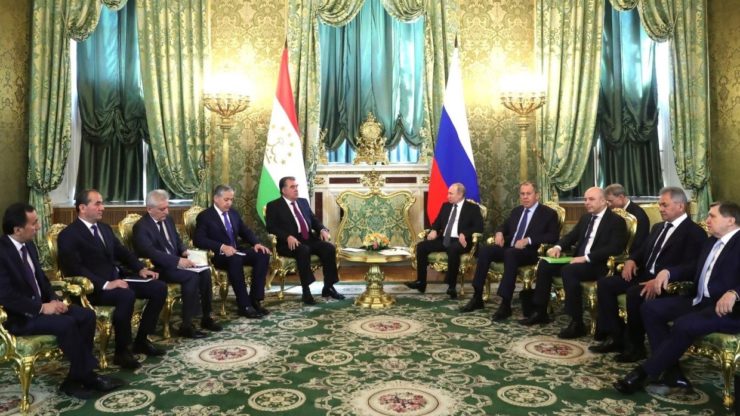
On 21 November, the leaders of Russia and Tajikistan – V. Putin and E. Rakhmon – met in Moscow.
During the meeting, they assessed the thirty-year experience of relations between the two countries, counting from the date of signing an agreement on friendship, co-operation and mutual assistance between the two states in 1993. The leaders of Russia and Tajikistan noted the “friendly and businesslike atmosphere” in the relations between the two countries, describing bilateral contacts as “unbreakable alliance between Russia and Tajikistan”
According to Tajik President Rakhmon, who arrived in Moscow with virtually the entire cabinet, the main purpose of his visit to Moscow was to discuss topical international security issues with Vladimir Putin. In the current geopolitical situation, Tajikistan justifiably pays special attention to its partnership with Russia. The situation in neighbouring Afghanistan, although stabilised over the past year, still does not appear favourable for the development of bilateral ties. In this regard, it is worth noting the active construction of the Kosh-Tepa irrigation canal by the Afghan Provisional Government, which may reduce the flow of water, a key economic and energy resource for countries such as Uzbekistan and Turkmenistan. This could further aggravate the so-called “Central Asian Water Problem”, which already complicates Tajikistan’s relations with its neighbours, who receive water from rivers originating in its territory.
At the same time, the neighbouring Turkic republics are focusing on partnership on ethnic grounds, bringing a fundamentally new level of interaction between themselves, as well as Azerbaijan and Turkey to a new level within the framework of the Organisation of Turkic States. In such a situation, Tajikistan should look for a partner in the person of Russia, even despite its geographical remoteness from the country’s borders.
As of 2022, the Russian Federation is Tajikistan’s key foreign trade partner: the trade turnover between the two countries exceeded $1.5 billion last year, which is quite serious by the standards of Tajikistan’s rather “compact” economy (almost a quarter of its total foreign trade). Russia is also the largest investor in Tajikistan’s economy with accumulated investments of $1.6 billion. For many years Russia has been promoting the development of the electric power potential of the Republic, which is rich in mountain rivers suitable for the creation of hydropower plants – the country is among the top 10 countries in terms of total reserves of hydropower resources. The flagship of bilateral co-operation between Russia and Tajikistan can be considered the country’s second most powerful Sangtuda 1 Hydroelectric Power Plant, which is a joint Russian-Russian-Tajik joint venture. which is a joint Russian-Tajik enterprise with a capacity of 670 MW.
Russia also plays a key role in ensuring Tajikistan’s social and economic security – it is the main supplier of oil products to the country, meeting the country’s demand for them by almost 100 per cent without customs duties, as well as the main recipient of labour from the country, which faces a serious shortage of jobs in the country. The accumulation of masses of unemployed people, which Tajikistan is avoiding by co-operating with Russia on this issue, could significantly aggravate the socio-political situation in the country, which currently has limited capacity to solve problems related to poverty and unemployment.
Year after year, more and more Tajik citizens are linking their future with Russia – as of mid-2023, almost one-third of the country’s population holds Russian citizenship. The “naturalisation” of Tajik citizens in Russia, by the way, is more active than that of their neighbours from Uzbekistan and Kyrgyzstan. The two countries are also actively promoting cooperation in the promotion of the Russian language, aimed, among other things, at ensuring this very “naturalisation”: following Rakhmon’s visit to Moscow, the parties agreed to expand partnership in this area by providing Tajikistan’s educational institutions of various levels with Russian language textbooks and expanding quotas for students from the republic to study in Russian universities.
Tajikistan also relies on Russia for its difficult relations with neighbouring states. Thus, Putin and Rakhmon mentioned the situation in Afghanistan as a pressing security issue in the region. This topical issue for Tajikistan will be discussed at the upcoming CSTO summit, which will be held on 23 November.
As a result of the meeting, the two presidents signed eight agreements, including a plan of cooperation in the industrial sector, a memorandum between the two countries’ transport ministries, a practical action plan on cooperation in the transport sector, a memorandum of cooperation between the ministries of economic development, a memorandum of understanding and cooperation on labour inspection and employment promotion, as well as an agreement between the Academy of Sciences of Tajikistan and the Kurchatov Institute.
Rahmon also invited Russian state and private companies to participate in the development of mineral deposits confirmed but not put into economic turnover, of which there are more than 800 in the country. He paid special attention to promising deposits of oil, uranium and lithium, which still remain untouched.
Thus, this meeting once again emphasised Russia’s role as the main pillar of Tajikistan’s national security, as well as the key importance of the bilateral partnership for the development and well-being of the two countries.
Boris KUSHKHOV, Department of Korea and Mongolia, Institute of Oriental Studies, Russian Academy of Sciences. Especially for online magazine “New Eastern Outlook”.